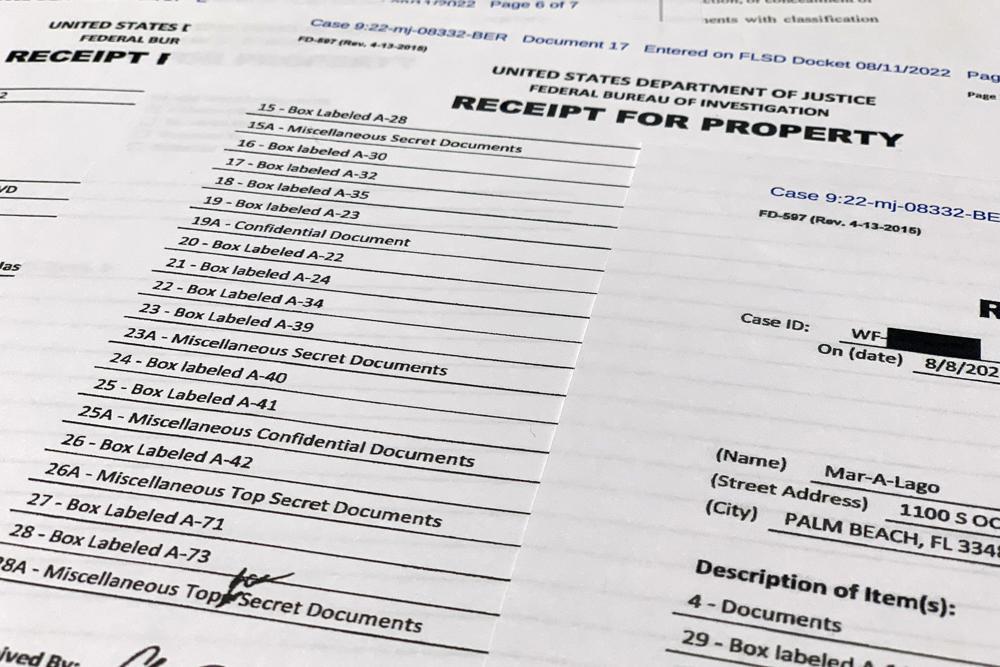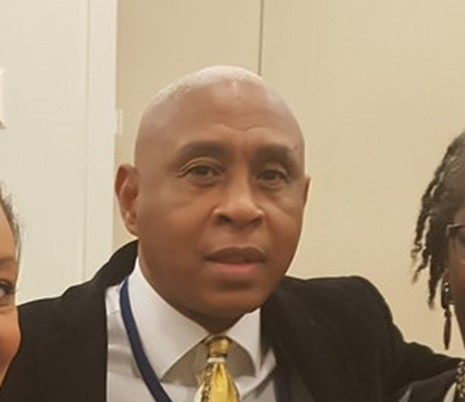FBI seized top secret documents in Mar-a-Lago search

The FBI recovered “top secret” and even more sensitive documents from former President Donald Trump’s Mar-a-Lago estate in Florida, according to court papers released Friday after a federal judge unsealed the warrant that authorized the sudden, unprecedented search this week. A property receipt unsealed by the court shows FBI agents took 11 sets of classified records from the estate during a search on Monday. The seized records include some marked not only top secret but also “sensitive compartmented information,” a special category meant to protect the nation’s most important secrets that, if revealed publicly, could cause “exceptionally grave” damage to U.S. interests. The court records did not provide specific details about information the documents might contain. The warrant says federal agents were investigating potential violations of three different federal laws, including one that governs gathering, transmitting, or losing defense information under the Espionage Act. The other statutes address the concealment, mutilation, or removal of records and the destruction, alteration, or falsification of records in federal investigations. The property receipt also shows federal agents collected other potential presidential records, including the order pardoning Trump ally Roger Stone, a “leatherbound box of documents,” and information about the “President of France.” A binder of photos, a handwritten note, “miscellaneous secret documents,” and “miscellaneous confidential documents” were also seized in the search. Trump’s attorney, Christina Bobb, who was present at Mar-a-Lago when the agents conducted the search, signed two property receipts — one that was two pages long and another that is a single page. In a statement earlier Friday, Trump claimed that the documents seized by agents were “all declassified” and argued that he would have turned them over if the Justice Department had asked. While incumbent presidents generally have the power to declassify information, that authority lapses as soon as they leave office, and it was not clear if the documents in question have ever been declassified. And even an incumbent’s powers to declassify may be limited regarding secrets dealing with nuclear weapons programs, covert operations, and operatives, and some data shared with allies. Trump kept possession of the documents despite multiple requests from agencies, including the National Archives, to turn over presidential records in accordance with federal law. The Mar-a-Lago search warrant served Monday was part of an ongoing Justice Department investigation into the discovery of classified White House records recovered from Trump’s home earlier this year. The Archives had asked the department to investigate after saying 15 boxes of records it retrieved from the estate included classified records. It remains unclear whether the Justice Department moved forward with the warrant simply as a means to retrieve the records or as part of a wider criminal investigation or attempt to prosecute the former president. Multiple federal laws govern the handling of classified information, with both criminal and civil penalties, as well as presidential records. U.S. Magistrate Judge Bruce Reinhart, the same judge who signed off on the search warrant, unsealed the warrant and property receipt Friday at the request of the Justice Department after Attorney General Merrick Garland declared there was “substantial public interest in this matter,” and Trump said he backed the warrant’s “immediate” release. The Justice Department told the judge Friday afternoon that Trump’s lawyers did not object to the proposal to make it public. In messages posted on his Truth Social platform, Trump wrote, “Not only will I not oppose the release of documents … I am going a step further by ENCOURAGING the immediate release of those documents.” The Justice Department’s request was striking because such warrants traditionally remain sealed during a pending investigation. But the department appeared to recognize that its silence since the search had created a vacuum for bitter verbal attacks by Trump and his allies and felt that the public was entitled to the FBI’s side about what prompted Monday’s action at the former president’s home. “The public’s clear and powerful interest in understanding what occurred under these circumstances weighs heavily in favor of unsealing,” said a motion filed in federal court in Florida on Thursday. The information was released as Trump prepares for another run for the White House. During his 2016 campaign, he pointed frequently to an FBI investigation into his Democratic opponent, Hillary Clinton, over whether she mishandled classified information. To obtain a search warrant, federal authorities must prove to a judge that probable cause exists to believe that a crime was committed. Garland said he personally approved the warrant, a decision he said the department did not take lightly given that standard practice, where possible is to select less intrusive tactics than a search of one’s home. In this case, according to a person familiar with the matter, there was substantial engagement with Trump and his representatives prior to the search warrant, including a subpoena for records and a visit to Mar-a-Lago a couple of months ago by FBI and Justice Department officials to assess how the documents were stored. The person was not authorized to discuss the matter by name and spoke on condition of anonymity. FBI and Justice Department policy caution against discussing ongoing investigations, both to protect the integrity of the inquiries and to avoid unfairly maligning someone who is being scrutinized but winds up ultimately not being charged. That’s especially true in the case of search warrants, where supporting court papers are routinely kept secret as the investigation proceeds. In this case, though, Garland cited the fact that Trump himself had provided the first public confirmation of the FBI search, “as is his right.” The Justice Department, in its new filing, also said that disclosing information about it now would not harm the court’s functions. The Justice Department under Garland has been leery of public statements about politically charged investigations, or of confirming to what extent it might be investigating Trump as part of a broader probe into the January 6 riot at the U.S. Capitol and efforts to overturn the results of the 2020 election. The department has tried to avoid being seen as injecting itself into presidential politics, as
Kay Ivey’s office releases photos after dismissing health rumors

Alabama Gov. Kay Ivey’s office released photos of her greeting South Dakota Gov. Kristi Noem at an airport on Friday, a day after it dismissed rumors that Ivey was having health issues just months ahead of the general election. The four photos showed Ivey, 77, with Noem beside a small jet that landed at the regional airport in Montgomery, where Noem was among the speakers scheduled to address an Alabama Republican Party fundraising dinner. Ivey was last seen in public on August 2 at a groundbreaking ceremony. On Thursday, Ivey’s office said she remained “healthy and cancer-free” as it knocked down rumors that she was having medical problems. Still, the governor’s office did not respond to questions asking about Ivey’s upcoming schedule, her whereabouts this week, and whether she had been in the hospital in the past four weeks. Ivey, who easily won the GOP gubernatorial nomination without a runoff in May, announced in 2019 that she had been diagnosed with early-stage lung cancer and would undergo radiation treatments. In 2020, she said the cancer appeared to be gone and that her doctor considered her free of the disease. Ivey is a heavy favorite over Democratic gubernatorial nominee Yolanda Flowers in the November general election. Republished with the permission of The Associated Press.
Jury: Democratic PAC defamed Roy Moore, awards him $8.2M

A federal jury awarded Republican Roy Moore $8.2 million in damages Friday after finding a Democratic-aligned super PAC defamed him in a TV ad recounting sexual misconduct accusations during his failed 2017 U.S. Senate bid in Alabama. Jurors found the Senate Majority PAC made false and defamatory statements against Moore in one ad that attempted to highlight the accusations against Moore. The verdict, returned by a jury after a brief trial in Anniston, Alabama, was a victory for Moore, who has lost other defamation lawsuits, including one against comedian Sacha Baron Cohen. “We’re very thankful to God for an opportunity to help restore my reputation, which was severely damaged by the 2017 election,” Moore said in a telephone interview. Ben Stafford, an attorney representing Senate Majority PAC, said in an emailed statement that they believe the ruling would be overturned on appeal. Moore, a former Republican judge known for his hardline stances opposing same-sex marriage and supporting the public display of Ten Commandments, lost the 2017 Senate race after his campaign was rocked by misconduct allegations against him. Leigh Corfman told The Washington Post and said Moore sexually touched her in 1979 when she was 14 and he was a 32-year-old assistant district attorney. Moore denied the accusation. Other women said Moore dated them or asked them out on dates when they were older teens. The accusations against Moore contributed to his loss to Democrat Doug Jones, the first Democrat to represent Alabama in the Senate in a quarter-century. The seat returned to Republican control with the 2020 election of Tommy Tuberville, a former college football coach. Senate Majority PAC funded a group called Highway 31 that ran a $4 million advertising blitz against Moore. The lawsuit centered on one TV commercial that recounted accusations against Moore. Moore’s attorneys argued the ad, through the juxtaposition of statements, falsely claimed he solicited sex from young girls at a shopping mall, including another 14-year-old who was working as a Santa’s helper, and that resulted in him being banned from the mall. The advertisement began with: “What do people who know Roy Moore say?” It followed with the statements “Moore was actually banned from the Gadsden mall … for soliciting sex from young girls” and “One he approached was 14 and working as Santa’s helper.” Wendy Miller had previously testified that she met Moore when she was 14 and working as a Santa’s helper at the local mall. She testified Moore told her she was pretty, asked her where she went to high school, and offered to buy her a soda. He asked her out two years later, but her mother told her she could not go. Moore’s attorneys argued the juxtaposition of statements in the ad painted Moore in a false light and falsely made it look like he was soliciting sex from girls at the mall. “In their ad, they strung quotes together to make a single statement. That’s what the jury found offensive. They got up and lied and said they didn’t intend that,” Jeffrey Scott Wittenbrink, an attorney for Moore, said. The Senate Majority PAC had argued the ad was substantially true and that there were widespread reports about Moore’s inappropriate behavior at the mall. An attorney said they planned to appeal. According to a Thursday court filing from Senate Majority, a Gadsden police officer who worked as security at the Gadsden Mall in the late 1970s — J.D. Thomas — testified that he told Moore not to return to the mall after receiving complaints from store managers that Moore was asking out teen employees or making them uncomfortable. Moore maintained he was never banned from the mall. “No amount of deflection or distraction from Roy Moore will change the fact that multiple individuals testified under oath to corroborate credible accusations against him. Many others have come forward to make their allegations public, at serious personal cost. We do not think this verdict is the right decision, but we believe the facts are clear, and this ruling will be overturned on appeal,” Stafford, an attorney representing Senate Majority PAC, said in an emailed statement. Republished with the permission of The Associated Press.
Randy Kelley elected chair of Alabama Democratic Party

Randy Kelley was elected chair of the Alabama Democratic Party on Saturday in a victory for longtime powerbroker Joe Reed, who lost a battle over control three years ago. Kelley won with 104 votes out of the 202 cast by members of the state Democratic Executive Committee. Kelley is a former vice-chair of the party but lost the position during the 2019 power struggle when the Democratic National Committee ordered new elections. “I personally know we are more in line with what Jesus stood for. He was for the least of these, and our opposition is for the most wealthy of these,” Kelley, a minister from Huntsville, told the gathered Democrats after winning the election. Kelley narrowly escaped a runoff that would have been required if no candidate captured more than 50% of the vote. Kelley defeated former congressional candidate Tabitha Isner and Josh Coleman, the president of Alabama Young Democrats. Coleman received 56 votes. Isner received 42 votes. Isner was later elected vice-chair of the party. State Rep. Chris England, who had served as party chair since the 2019 power struggle, did not seek another term as chair. Kelley’s election was a victory for Reed, who had supported former chair Nancy Worley and Kelley in the 2019 power struggle. Reed, chairman of the Alabama Democratic Conference, the state’s oldest Black political organization, had backed lawsuits that challenged bylaw changes that led to England’s election. Both of the state’s two major political parties met over the weekend. The governing body of the Alabama Republican Party passed a resolution urging the Alabama Legislature to approve closed primaries that require voters to register with a political party in order to vote in that party’s primary. Currently, Alabama has open primaries. The GOP also passed a resolution condemning the FBI raid of former President Donald Trump’s residence as harassment and a federal overreach. The FBI recovered “top secret” and even more sensitive documents from Trump’s home, according to court papers released Friday. Republished with the permissionof The Associated Press.

